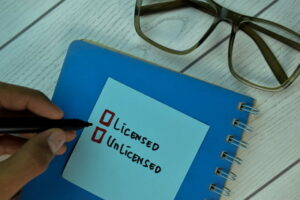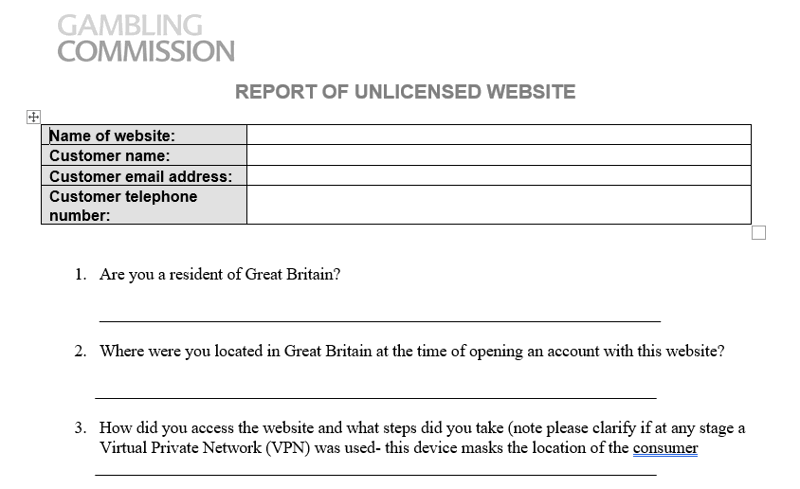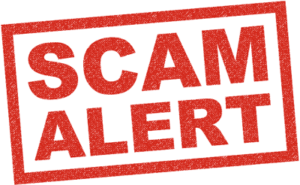 If you know about the online gambling world, you’ll know about some of its problems, too. In the UK, the Gambling Commission takes care of the industry. At least, in theory. This doesn’t stop unlicensed casino and sports betting sites from opening their doors, though.
If you know about the online gambling world, you’ll know about some of its problems, too. In the UK, the Gambling Commission takes care of the industry. At least, in theory. This doesn’t stop unlicensed casino and sports betting sites from opening their doors, though.
These sites are able to operate in any way they choose without an official licence. This is because there aren’t any regulations in place for them to follow. Unlicensed casinos are able to take advantage of their customers. This includes taking their money, withholding withdrawals, not protecting personal data, and so on. Various stories have risen up about people suffering at the hands of rogue operators.
If you come across an online gambling site that isn’t licensed, can you report it? After all, the Gambling Commission is the body that sets about taking these down. You’re not able to do it yourself. Yet can you take steps to report that site to the relevant department? Here, we’ll look at the steps you need to take to be able to do this. There is a process in place, although let’s say that the Commission doesn’t make it so easy. Let’s take a look at how you go about reporting unlicensed sites.
Evidence of Casework Undertaken on Illegal Gambling
 The aim of the UKGC and its regulatory activity is to disrupt any illegal operations. Every year, it tackles operators looking to transact with players in Great Britain. Various reports come its way, providing intelligence on potential illegal gambling activity. The Commission takes action against those that it considers to be the biggest risk. So that anyone and everyone can follow its progress, the UKGC publishes reports on its activity.
The aim of the UKGC and its regulatory activity is to disrupt any illegal operations. Every year, it tackles operators looking to transact with players in Great Britain. Various reports come its way, providing intelligence on potential illegal gambling activity. The Commission takes action against those that it considers to be the biggest risk. So that anyone and everyone can follow its progress, the UKGC publishes reports on its activity.
Between April 2021 and March 2022, the UKGC prioritised 89 instances of casework. That is a drop of 10 priorities in comparison to the same period in the previous year.
There are three stages of action that the Commission is able to take on unlicensed activity. The first stage sees a ‘Cease and Desist’ notification sent to the operator in question. The same occurs at stage two, should nothing come of it in stage one. After that, hosting companies of the sites receive notifications of the illegal activity. Between April 2021 and March 2022, 68 stage one actions occurred. There were nine stage two actions undertaken, and 19 hosting company notifications sent.
A total of 23 geolocation IPs ended up blocked. The suspension of two illegal websites also occurred. A lot more happened in the April 2020 to March 2021 period, though. Three websites ended up suspended and 14 had their GB registration removed. A total of 13 had their IPs blocked, while 10 hosts removed the websites reported. The owners of seven illegal gambling sites took down their operations.
Not all the actions taken by the Commission are as a result of customer reports. In fact, a lot of the time they manage to locate the illicit websites themselves. Even so, should you find one operating in the UK yourself, we’re going to outline what you should do.
Reporting an Unlicensed Online Gambling Site Yourself

If you have found an unlicensed site offering its services to UK residents, it is up to you what to do. Nobody will force you to report it and nobody will seek you out if you don’t. The Commission doesn’t rely on reports from citizens to tackle illegal operations. Of course, it also won’t object to receiving such help, either.
The Commission does have its own website section for reporting something in confidence. This includes submitting reports about any of the following:
- Match fixing and sports betting integrity
- Underage gambling
- Money laundering
- Suspicious activity
- Unlicensed gambling
- Criminal activity
It is important to note that if you do submit a report, the UKGC cannot provide feedback on the information. This is because it could result in an investigation. Any details made public could thus jeopardise such an investigation as a result. This is why there is a public sanctions register to view. Any action taken against an individual or gambling business will appear there. There is a phone number that you can call to speak to an advisor and make a report. This is available to call between 9am and 5pm, Monday to Friday.
Otherwise, you can submit a form to the Commission via email. The likelihood is that you receive this after calling them anyway. You may need to then send that form to the Commission via post. Within that form, there are various questions present for you to answer. To start with, you need to note the name of the website, your name, email address and telephone number.
There are several things that we can highlight as what the Commission cares about. On the form, you will need to note your location upon opening an account and if you are a GB resident.
After that, you should write how you accessed the offending website. If you utilised a VPN to gain access, it is important to highlight this, too. The Commission will also want to know how you discovered the illegal gambling site. For example, did you receive an email or text message advertising it in specific? Or did you complete a Google search, and it appeared as a result?
It’s also relevant to highlight whether you deposited money at the illegal casino. If so, the Commission needs to know which payment method you used for it. Plus, you need to comment on the number of deposits you’ve made. A statement should also show what the name of the company is where your deposit went. It may also be better to share a redacted copy of your statement to display that merchant.
The final few questions start with asking how you gambled at the site. Was it a smartphone, a tablet, a desktop computer, or something else? The number of times you gambled is something else the form asks about. Furthermore, it wants to know the types of games or products you have gambled on at the site. Another prominent question surrounds whether you have been able to make a withdrawal. If you have tried and been unsuccessful, then the operator is likely holding your money back.
There is a further section that asks if you have had any correspondence with the website. If so, then a copy of it needs attaching to the form. If the Commission has any further questions for you about your submission, it may contact you.
Is Unlicensed Gambling a Big Problem in the United Kingdom?
 Everyone knows that the UK has a liberal gambling industry. All forms of gambling are legal, provided the operator holds an official licence. This makes it quite the appealing scene for many people to get involved in. That doesn’t stop unlicensed gambling sites from entering into the UK’s industry, though.
Everyone knows that the UK has a liberal gambling industry. All forms of gambling are legal, provided the operator holds an official licence. This makes it quite the appealing scene for many people to get involved in. That doesn’t stop unlicensed gambling sites from entering into the UK’s industry, though.
It costs money to apply for a gambling licence. In total, operators pay £370 to make such an application. That fee is non-refundable, even if the application for the licence is unsuccessful. After the application fee, if you are successful, you need to pay the first annual fee. This needs to occur within 30 days of you receiving the licence. There is then an annual fee to pay to continue holding that same licence, too. Different types of licences cost different amounts on a yearly basis. The Gambling Commission provides a fee calculator for you to use to figure these out.
These fees may be quite plausible for a company that has some money behind it. Yet those looking to scam people aren’t in that position most of the time. They are looking to get money out of people instead. Thus, opting against paying out for a licence from the Commission is their chosen route. They don’t have a huge outlay to pay, and they provide casino gaming to players. Of course, this also means that there are no protections in place for those gamers.
It seems as though there isn’t a huge slow-down on unlicensed casinos operating for UK players, either. The Betting and Gaming Council (BGC) recently revealed quite the surprising figures. In 2022, it made a report on the size of black-market gambling across Europe. This has risen following the increase in stricter measures on those regulated operators. The study took place with the idea that the UK’s own gambling review was due to take place. Of course, the white paper on this is still something people are waiting to see. Yet the numbers within the report are startling, to say the least.
The number of British punters making use of unlicensed gambling sites has doubled in 2 years. Today, around 460,000 people get involved in these rogue operations. The amount staked (and often lost) on them amounts to billions of pounds. There are various comparable markets to the UK’s across Europe, too. They have also experienced issues with unlicensed gambling, such as:
- In Norway, a state monopoly on all gambling is active. Restrictions on stakes, affordability checks and advertising also exist. This has resulted in a black market which accounts for over 66% of all money staked by Norwegians.
- In France, online casino games are also controlled by a state monopoly. The black market accounts for 57% of all money staked.
- In Italy, the advertisement of gaming and betting is 100% banned. A total of 23% of all bets placed occur on the black market.
- In Spain, there is a near total ban on gambling of all types. Spanish players are thus unaware of sites that they can bet at in a safe way. This means the black market takes 20% of all wagers from within.
- In Denmark, tight restrictions came about in 2020 surrounding loyalty bonuses. The Danish Tax Authority warned of a potential 9% increase in black market takings.
- In Sweden, a national survey occurred revealing that 38% of gamblers who had self-excluded could still gambling online. This was possible through unlicensed operators, thereby circumventing any protections in place.
Through this report, the BGC was trying to highlight the downfalls of tighter restrictions. Various European countries have introduced such measures. Yet this has led to an increase in gambling at unlicensed websites. That doesn’t work in the favour of customers or the economies of countries, either.
Unlicensed gambling sites are still on the rise, too. The threat of UK gambling reform is ever present, despite nothing coming of it yet. The government keeps saying that it will arrive, even though it should have in 2021. Then in 2022. Will 2023 see the tighter restrictions brought into place?
As such, this has led to various authorities and media outlets warning gamblers of scam sites. A stricter environment is exactly what unlicensed operators are able to take advantage of. Should players feel they cannot get what they want out of licensed platforms, what can they do? Visit a black market site instead so that they can get involved with such. That leaves players a lot more open to serious issues. Sites of this nature can include questionable promotions to draw such players in, too. They may promise one thing and not deliver on it. They may even incorporate unachievable terms and conditions for such.
Younger people are also a lot easier to trick into joining such casinos and sportsbooks. Unlicensed sites will make the outright decision to aim their casinos at this market. Experts suggest that the trend in unlicensed casinos is still growing, too. Experts claim that illegal casinos attract around 1,000 new users every month.
If you compare that figure with those reported in 2019, it has doubled. In three more years, experts believe it will have doubled again. A big issue in the United Kingdom? Yes, for sure. Should gambling restrictions become overwhelming, then it may get even worse. It’s not only in the UK, either. Across the world, black market gambling is on the rise. Should you report an unlicensed site to the Commission? If you think people should have the right sort of protection when gambling, then yes.